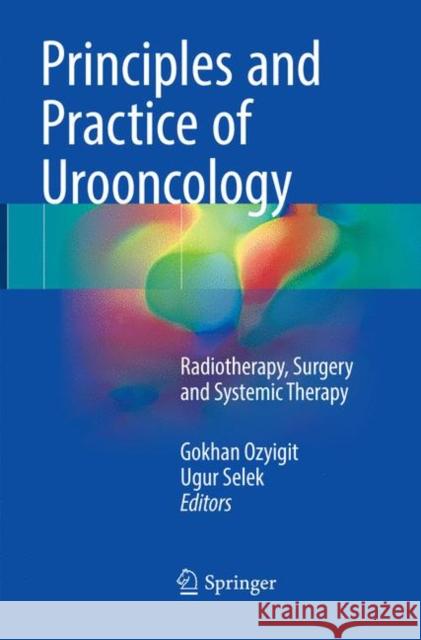Principles and Practice of Urooncology: Radiotherapy, Surgery and Systemic Therapy » książka
topmenu



ISBN-13: 9783319858296 / Angielski / Miękka / 2018 / 445 str.
ISBN-13: 9783319858296 / Angielski / Miękka / 2018 / 445 str.
1. Selection criteria based on Radiation Oncology perspective for definitive treatment approaches in urological cancers
2. Radiological imaging in urological cancers
3. The role of functional imaging in urological cancers
4. Surgery in renal cell cancer
5. Systemic therapies in renal cell cancer
6. The role of radiotherapy in renal cell cancer
7. Screening of prostate cancer: Pros and Cons
8. Risk groupings in prostate cancer
9. Active surveillance in low risk cancer: Pros and Cons10. Alternative focal therapies in low-risk prostate cancer: HiFU and Cryotherapy
11. Robotic surgery in prostate cancer
12. Radical retropubic prostatectomy in low-high risk prostate cancer
13. Guidelines for the delineation of primary tumor target volume in prostate cancer
14. Guidelines for the delineation of lymphatic target volumes in prostate cancer
15. Modern radiotherapy techniques in prostate cancers
16. Protontherapy for prostate cancer
17. Brachytherapy for prostate cancer
18. Stereotactic body radiotherapy for prostate cancer
19. The role of hormonal therapies and radiotherapy in prostate cancer
20. The role of hormonal therapies after surgery21. PSA after radiotherapy: Biochemical failure and PSA bounce
22. Adjuvant and Salvage Radiotherapy in prostate cancer
23. Reirradiation in prostate cancer24. Systemic chemotherapies in the management of prostate cancer
25. Translational research and immunotherapy in prostate cancer
26. Surgery in superficial and invasive bladder cancer
27. Target volume delineation guidelines in bladder cancer
28. Bladder preservation therapies in bladder cancer
29. Systemic chemotherapies in bladder cancers
30. Translational research and immunotherapy in bladder cancer
31. Radiolabelled targeted therapies in urological tumors
32. Radiation induced toxicity and related management strategies on urological malignancies
33. Quality assurance of modern radiotherapy techniques in urological malignancies
Gokhan Ozyigit graduated from Hacettepe University Faculty of Medicine (English) in 1996 and then obtained ECFMG Certification in the USA. In 2001 he completed his Residency at the Department of Radiation Oncology at Hacettepe University. He later became a Research Fellow at the Departments of Radiation Oncology at Washington University and The University of Texas M.D. Anderson Cancer Center. In 2004 he was appointed Assistant Professor at the Department of Radiation Oncology at Hacettepe University and in 2006 became an Associate Professor there. He is currently Chair at the Department of Radiation Oncology and Director of Advanced Cancer Technologies Research & Application Center at Hacettepe University. Dr. Ozyigit is an editorial board member of several international journals. He is also a reviewer or advisor for a number of other international journals, co-editor of seven previous books, and has authored numerous articles in peer-reviewed journals and book chapters. He received several national awards in the field of Oncology.He is a member of Board of Directors of Turkish Society for Radiation Oncology.
This evidence-based, state of the art guide to the management of urological malignancies, including bladder cancer, prostate cancer, and testicular cancer, is designed to serve as an easy-to-consult reference that will assist in daily decision making and the delivery of optimal care for individual patients within a multidisciplinary setting. Readers will find up-to-date information on patient selection and the full range of treatment modalities, including modern radiotherapy techniques, systemic chemotherapy, surgical procedures (including robotic surgery and other minimally invasive approaches), hormonal therapies, immunotherapy, and focal therapies. With regard to radiotherapy, the coverage encompasses everything from delineation of tumor volumes and organs at risk based on CT simulation through to delivery of stereotactic body radiotherapy, intensity-modulated radiation therapy, tomotherapy, volumetric modulated arc therapy, and proton therapy. The authors are leading authorities with international reputations who have been selected for their expertise in the topic that they address. The book will be of value for all practicing urooncologists as well as other oncology fellows and residents interested in urooncology.
1997-2026 DolnySlask.com Agencja Internetowa







